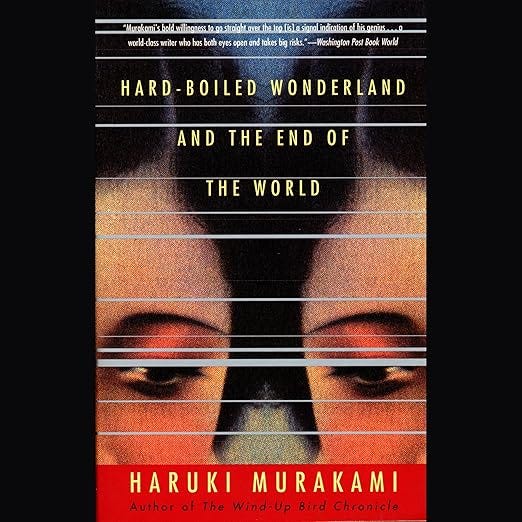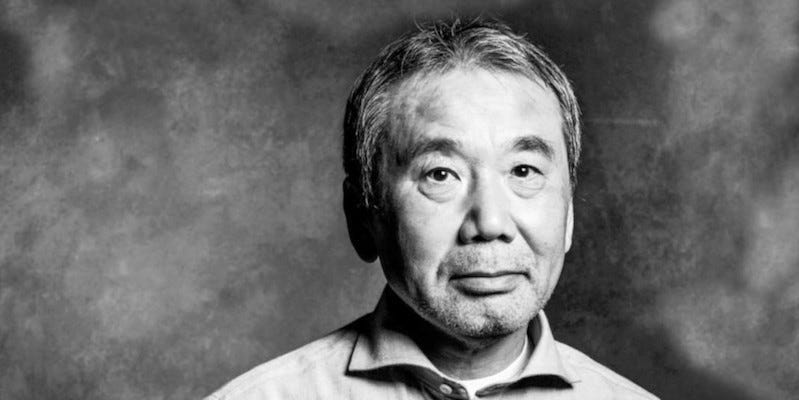Reading Dreams From Unicorn Skulls
Book Review: Hard-Boiled Wonderland and the End of the World
“Most human activities are predicated on the assumption that life goes on. If you take that premise away, what is there left?”
― Haruki Murakami, Hard-Boiled Wonderland and the End of the World
Genre: Science Fiction/Fantasy
My rating: 5 out of 5 stars
This book is weird and wonderful and not exactly what I’d call a fun, easy read. It’s complex and heady and filled with symbolism and philosophical inquiries about the nature of consciousness. I love the magical realism of Murakami’s other works (Kafka on the Shore, The Wind-Up Bird Chronicle, 1Q84, etc.) but this one delves into fantasy and science fiction, which is not his usual fare, but it works.
The book follows two parallel plots, each in different genres: The hard-boiled wonderland part, the odd chapters, take place in a cyberpunk version of contemporary Tokyo. In this narrative, the unnamed protagonist is a “Calcutec,” a human data processor who has undergone a surgical procedure to enable him to “shuffle” data from one brain hemisphere to the other, in order to encrypt it.
Calcutecs work for the System, a quasi-government agency, that is concerned with protecting information. The Factory is an underground, criminal organization that is bent on stealing this data. The Factory employs “Semiotecs” to do this work. Our protagonist is hired to do a job for a scientist, the Professor, who works out of an underground laboratory, surrounded by Inklings, which are straight from Japanese Kappa folklore. The Professor is studying “sound removal,” for which he uses the skulls of unicorns. He gives the protagonist a skull to shuffle its data at home and if he isn’t back in a day and a half, he’ll disappear into his subconscious and never come back.
The End of the World narrative, the even chapters, is a completely different Kafkaesque world from a technologically underdeveloped time. In order to enter the Town, which is surrounded by an impenetrable wall, the Gatekeeper has to remove the narrator’s shadow. Shadows hold memories and aren’t allowed in the Town. His Shadow has to live in the shadow grounds outside the walls of the town and do the work of chopping off the heads of dead unicorns and burying their bodies. Without a body, the Shadow isn’t expected to live through the winter. The Shadow tasks the narrator with mapping the Town so they can figure out how to escape it.
The Gatekeeper administers a procedure to the narrator’s eyes that makes him extremely sensitive to light, which discourages him from going outside during the daytime. The narrator gets a job in the library as a “dreamreader.” The library has tons of unicorn skulls, which carry dreams (the language of the subconscious) and his job is to read them to extract information. He falls in love with the librarian who helps him find an old accordion, which facilitates another connection to the real world.
These two worlds remain separate for the first part, start to intertwine in the middle, and inform each other toward the end. I suspected from the very beginning that both narrators are two halves of the same person, shadows of each other, if you will. The Shadow that gets removed from the narrator in the Town is the Calcutec from the Hard-boiled world. The Town represents the subconscious, which is unknown and unmapped. The Shadow, who is reason and logic, wants to map it, understand it—bring it into consciousness.
There are several themes that he touches on in this book, including a critique of modern society and our desires to escape the inherent oppression in our systems of authority. But most of all, it’s an exploration of the nature of consciousness and reality. The idea of descending into the underworld in order to reunite lost parts of the self is a fairly common mythical theme. In psychology, this is called integration.
Whether he decides to stay with the librarian (soul) or escape with his Shadow (mind) is a deeply spiritual decision. I won’t give away the ending, but it’s fairly open-ended and you kind of have to make your own assumptions. For readers who need concrete answers and resolutions, this can be frustrating. I happen to like books that raise questions rather than presenting answers in a neat bow, so to me this was a very rewarding book.
If you enjoyed this book review, check these out!




